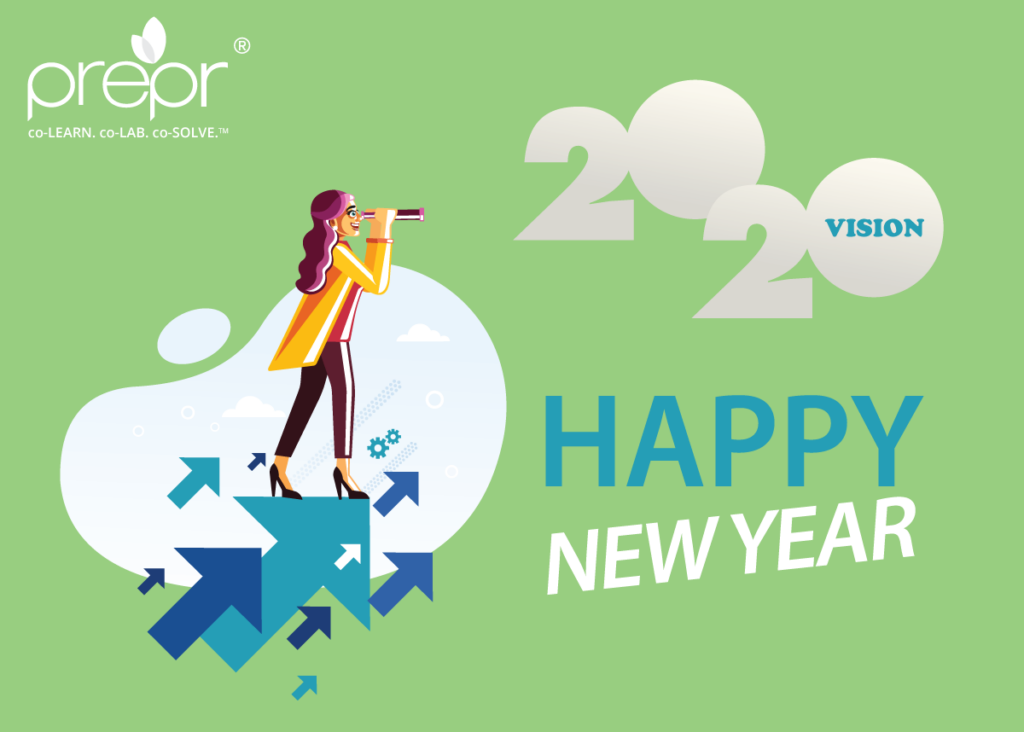Happy New Year! As we move into a new decade, now is an ideal time to pause and reflect on the past year and to consider what innovations are positively disrupting not only education, but also other industries. Continue reading to get insights and to learn about the launch of our Futur{e}Challenge series and what is on the horizon for 2020.
Innovations in Education
As we move into the second half of the school year, here are some great tools in addition to the Prepr app to bring challenge-based learning in the classroom!

- Adobe Spark: This design tool includes templates that lets teachers and students design everything from a web page to social media posts
- Google CS First: A computer science curriculum with themed coding projects that makes coding less intimidating and more accessible to people from all different backgrounds.
- CueThink: This math tool focuses on having students solve math problems, share their solutions, get peer feedback, and then improve their solutions by letting them learn from mistakes.
- Newsela: With leveled texts aimed at the classroom, this news platform addresses current events and trending issues.
- Scratch: A coding program made by MIT, it has an incredible community of kids teaching and working with other kids the exciting world of coding by teaching them basic functions and letting them create their own programs!
- Prepr: With the official Prepr app, you can create projects, connect with employers and earn badges by completing challenges!
The Futur{e}Challenge
This October, Prepr brought together people from government, industry and the technology sector for the inaugural the Futur{e}Challenge.
One of our most anticipated events of 2019 was the launch of Futur{e}Challenge, our nationwide initiative designed to bring together the public and private sector to join forces and establish programs to address the skills gap facing many organizations. Prepr was joined at Fasken by many companies and professionals from the technology, energy, manufacturing, healthcare, food and retail industries where a conversation was had on the future of these industries. Attendees were able to network with one another, discuss solutions to current problems in their respective industry and prepare for the future impact of their industries with smart city, artificial intelligence and cybersecurity technology.

The Futur{e}Challenge is currently underway and the next working session is planned for January 30th,(Manufacturing), January 31st (Health) and February 6th (Retail). We are also introducing a day focused on work-integrated learning on February 7th for co-op and career centre professionals working in education. Interested in attending? Order your tickets on Eventbrite or send us an email to explore how you can get involved.
Innovations in Industry
As we head into a new year, let us also reflect on the change in industries, exciting technology coming up in the future and how the future is closer than you think.
- Hyper-automation – Hyper-automation is a combination of multiple machine learning, packaged software and automation tools to deliver work. It refers to not just the breadth of the pallet of tools, but also all of the steps of automation itself.
- Multi-experience – Multi-experience deals with a multimodal kind of interface world where we’re immersed in the technology. Multi-experience technology deals with merging virtual reality (VR), augmented reality (AR) and mixed reality (MR) and changing how people perceive the digital world.
- Transparency and traceability – Transparency and traceability are critical elements to support digital ethics and privacy needs as a society, people and employees are demanding to understand how their personal data is being secured and managed.
- Autonomous creations – This involves how we’re looking at autonomous tech, including robots and drones and vehicles and how they’re becoming more autonomous and how they share a lot of the core underlying processes. As technology capability improves, regulation permits and social acceptance grows, more autonomous things will be deployed in uncontrolled public spaces.
- AI security – AI and machine learning will continue to be applied to augment human decision making across a broad set of use cases. This creates opportunities to enable hyper-automation and leverage autonomous things to deliver business transformation but also creates new challenges for security teams, with a huge increase in potential points of attack with IoT, cloud computing, micro services and highly connected systems in smart spaces.
—
Thanks for reading and be sure to follow Prepr on our social media channels to get timely updates on all things Prepr.
You can also head to the Apple store or the Google Play store to download the Prepr app by going to http://onelink.to/prepr on your mobile device and get started on building your skills for tomorrow, today!

